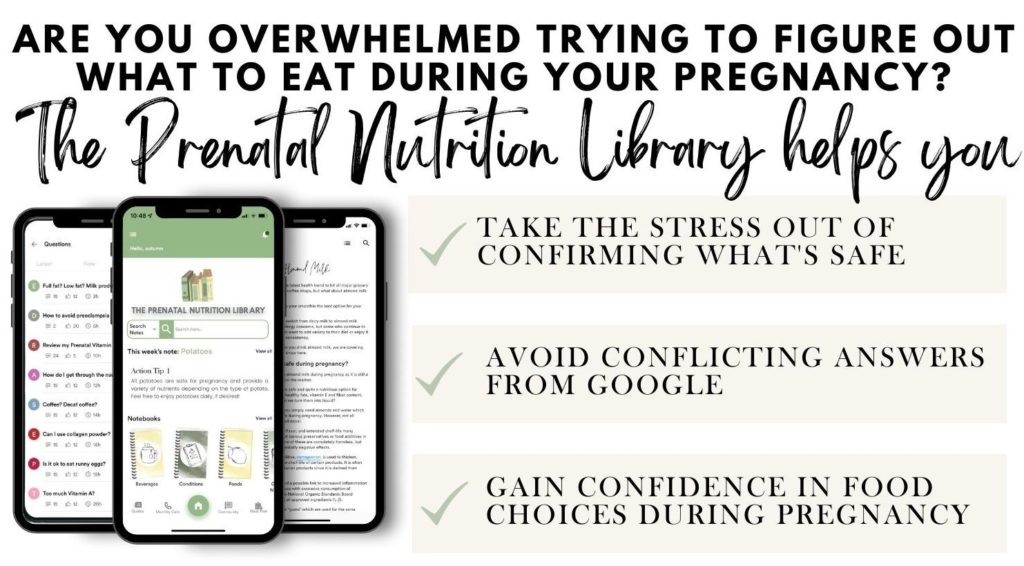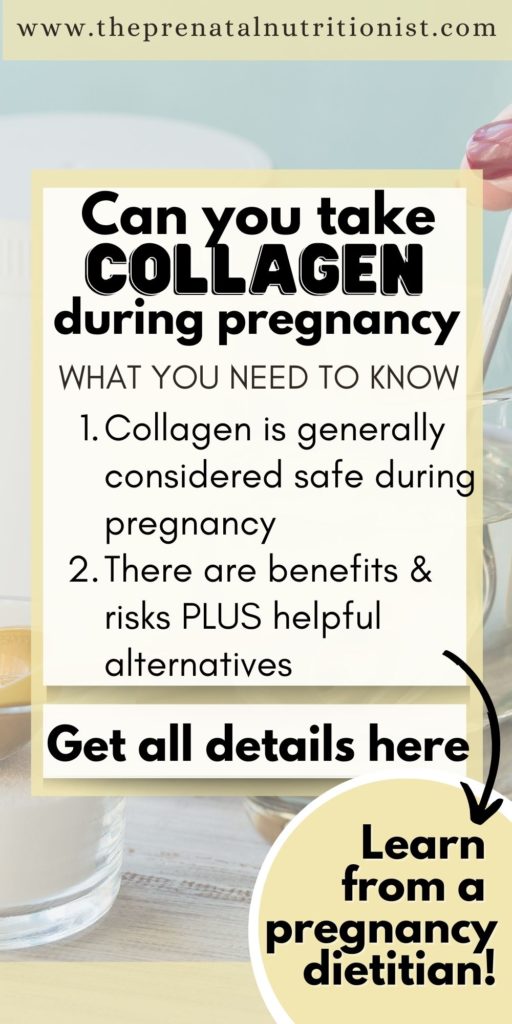
Collagen is more than just a beauty buzzword for our skin, hair, and nails. It is the most abundant protein in the human body. It provides strength and structure to your skin, joints, and bones. Collagen is naturally synthesized in the body and makes up about 30% of the protein in the human body. Collagen plays a vital role in replacing dead skin cells. This abundant protein is also related to skin health because it gives structure and elasticity to the skin which can help with skin hydration.
You’ve most likely seen collagen skincare products and supplements. But did you know there is more than one type of collagen? There are actually 28 different kinds of collagen. They all have different structures and are found in other areas of the body. Each type also contributes differently to your body’s overall health.
During pregnancy, women’s bodies undergo many changes to support the growth and development of the baby. This means your body requires a higher amount of many nutrients. As a result, many pregnant women look to supplements, like collagen peptide powders, to keep up with the demands and fill the gaps.
Because many people in your shoes, i.e., trying to conceive or pregnant, wonder whether collagen peptide powder supplements are safe, I’ve dedicated this post to learning more about collagen! Read on below to learn if it is safe to take collagen, its benefits, potential risks (if any), and the best ways to add it to your diet.
Can You Take Collagen Powder While Pregnant?
As with any other dietary supplement, brands vary significantly. However, collagen peptide powder is generally safe during pregnancy with a few considerations. This 2016 research study proves the safety of collagen powder during pregnancy and postpartum.
The supplement industry as a whole needs to be better regulated. Therefore, I always recommend a food-first approach when possible and limit supplements to the necessary to be careful. With that said collagen peptide powder supplements can sometimes be beneficial during pregnancy. Such as if someone does not eat meat or does not eat a sufficient amount of the right types of meat.
When choosing a collagen peptides powder supplement for pregnancy, look for a third-party tested option. Collagen supplements are generally safe but we also encourage informing your healthcare provider before adding any new supplements!
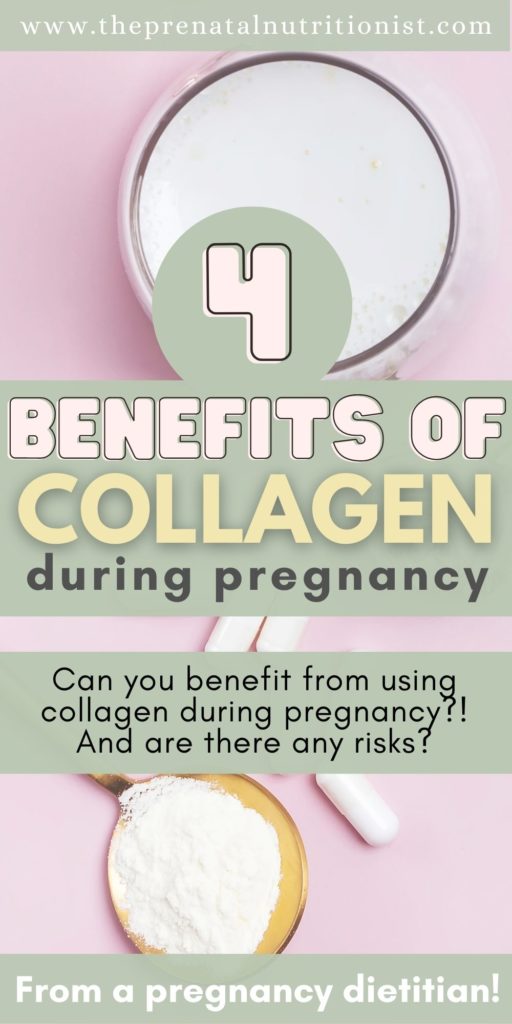
Benefits Of Collagen During Pregnancy
Pregnant people have A LOT on their plates, we get it. Growing a human is a 24/7 job, after all. Taking collagen supplements during pregnancy can be beneficial not only to you but also to your growing baby. Here are just some of the benefits of collagen for pregnant women.
Well-tolerated during morning sickness
Morning sickness is a common pregnancy symptom affecting up to 70% of pregnant women. Collagen peptide powders are often unflavored and mixed well into many items to boost protein. Pregnant people often find they can bump up their protein intake during the first trimester by adding collagen powder to foods like smoothies, applesauce, oatmeal, yogurt, or even water.
Increases your protein intake
As mentioned above, collagen is a source of protein. The protein requirement for pregnant people varies per individual, but it does increase during and throughout pregnancy. Meeting protein goals can be challenging for some, especially when dealing with aversions, nausea, and fatigue. Collagen powder supplements are an easy and quick way to boost protein intake. Please keep in mind, however, that collagen should not be considered a replacement for a well-rounded diet rich in various protein sources. Unlike options such as grass-fed beef, collagen is missing one of the nine essential amino acids. This means while it’s an excellent protein source, it shouldn’t be your ONLY protein source.
If you also wonder if protein powder is safe during pregnancy, read about this topic in the linked post. You can also read more about plant-based sources of protein for pregnancy HERE.
May play a role in the prevention of stretch marks
One of the primary functions of collagen is its role in skin health. It supports the skin structure and helps maintain skin elasticity. We know during pregnancy, the body undergoes a lot of changes. Although not proven with research, the theory is that collagen peptide powders could help provide the building blocks needed for collagen synthesis in the body and support those skin health benefits. Hopefully, supporting skin elasticity and connective tissue could reduce the risk of stretch marks. But, again, the research to support this needs to be improved.
Supports joint health
Aching joints are not an uncommon pregnancy complaint. We know collagen plays a role in joint structure and function within the body. There have been some small studies that have found collagen powder supplementation helpful for those with osteoarthritis and joint pain. This area needs additional research to confirm its benefits, but it shows promise!
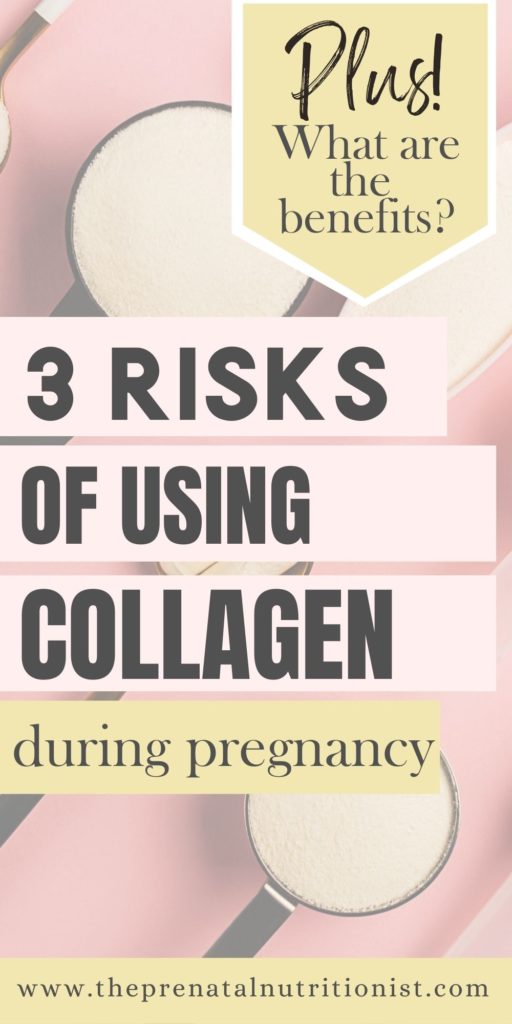
Risks Of Collagen Supplements During Pregnancy
While most pregnant women don’t experience any side effects from collagen supplements, there are still some considerations to remember. Below are some of the potential risks to watch out for:
- Contamination: Supplements, in general, including collagen powder, can be contaminated with heavy metals. It’s so important to choose trusted brands that use third-party testing for the purity and quality of ingredients.
- Allergic reactions: Some people can have sensitivities to collagen supplements or the ingredients in them. For example, some collagen supplements are made from fish sources, which could be an allergy source for some individuals. Therefore, it is essential not to consume a food or supplement with ingredients you are allergic to.
- Interactions with other medications: If you are taking medications, it is always best to consult with your doctor before taking any new dietary supplement to be sure there are no medication interactions or contraindications.
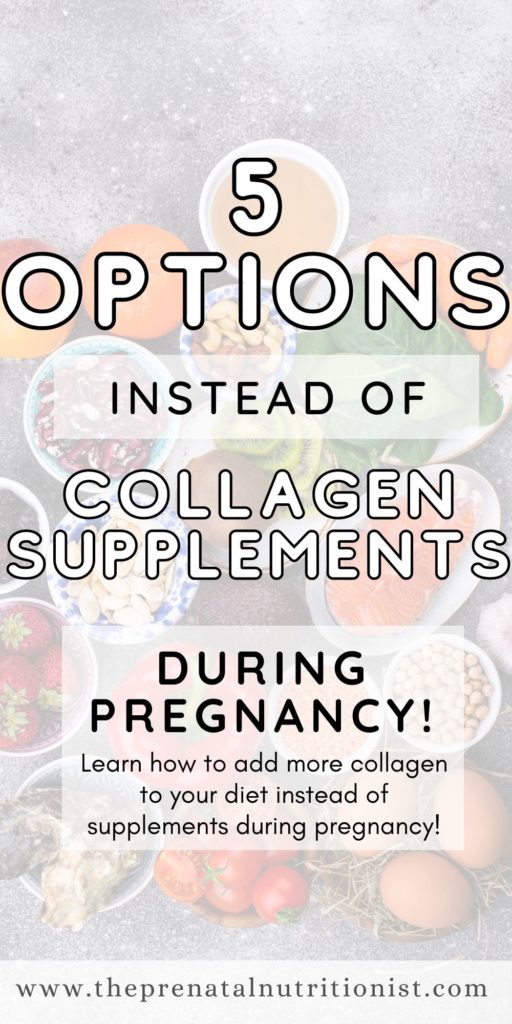
Alternatives To Collagen Supplements
You don’t have to take collagen powder supplements! It is recommended that you incorporate foods rich in glycine and vitamin C to help provide the building blocks for collagen synthesis in the body. Food gives us many benefits beyond what can be found in a supplement. I always recommend food first whenever possible. Here are some of the best food sources of glycine as alternatives to collagen supplements.
Beef bone broth
Beef bone broth is one of the top sources of collagen and glycine. This highly nutritious broth supplies collagen as well as other minerals and electrolytes that are important for pregnancy. Calcium, magnesium, zinc, and heme-iron are some nutrients in bone broth. I’ve discussed in detail the benefits of bone broth in a past post and how to prepare it properly.
Chicken and Chicken Skin
Some types of collagen supplements are derived from chicken. Others are derived from bovine or marine sources. This popular white meat is rich in type II collagen, which helps provide flexibility and support to bone joints. In addition, there’s interesting research on the use of chicken neck and cartilage and its possible ability to reduce skin aging. Collagen-rich chicken parts include the neck, feet, and skin. Mix this together for a yummy broth, or have a rotisserie chicken with the skin!
Fish and seafood
Fish and seafood have less collagen than pork and beef, but they are still a good source of collagen, protein, and several other nutrients. Marine collagen is said to be well-absorbed and bio-available to the body. Even more than meat sources. Collagen is most abundant in fish skin and bones. Sardines and salmon are two popular choices for collagen-rich fish. Sardines are often eaten with the bones and skin on.
Gelatin gummy candies
This may not have been the first option you thought of, but they are sure yummy! Make your own homemade gummy gelatin candies. There are so many great recipes that are also low in added sugar. If you want a healthier treat, this could be a great option. Many of these healthier homemade gummy alternatives also supply extra vitamins and minerals.
Citrus fruits (not a source of collagen!)
Vitamin C aids in the body’s production of collagen. Although fruits don’t have collagen, they can help synthesize collagen in the body. Some of the best fruits for collagen production include oranges, lemons, limes, and grapefruits because they are good sources of vitamin C.
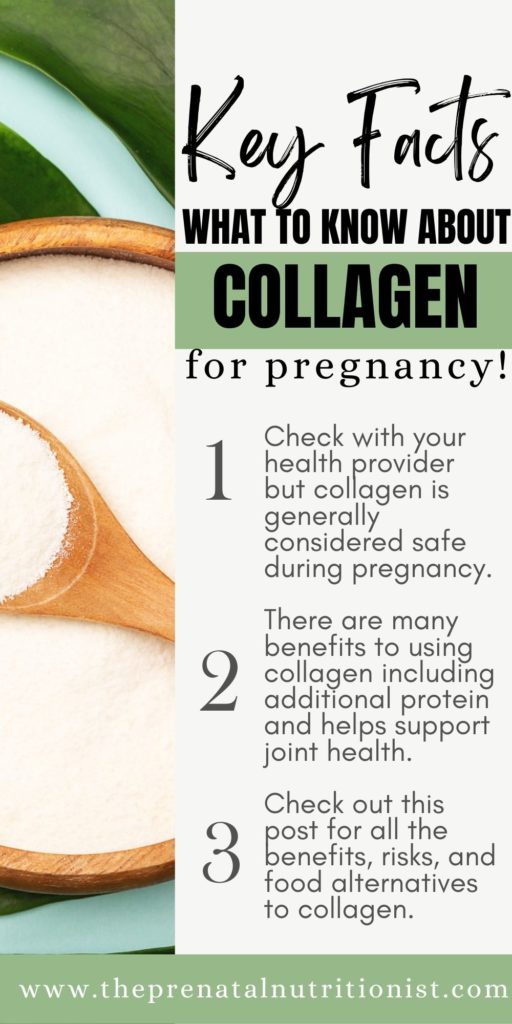
Collagen supplements or natural food sources?
While the body produces collagen naturally, pregnant women will benefit from increasing their glycine and collagen intake. Food sources are a great place to start. But, taking collagen supplements during pregnancy can be an easy way to get the amino acid, glycine, and protein when needed.
You can get collagen through supplements like collagen powder or natural food sources like bone broth and animal skin (cooked). Make sure to consult with your healthcare provider or dietitian first before taking any new supplement. It is always best to incorporate a variety of protein sources in your diet versus relying on any one food or supplement choice.
I hope you learned a lot from this article! Will you take collagen supplements, or do you prefer to get this protein from natural food sources? For information on calculating your protein needs for pregnancy, collagen, protein powders, the right prenatal vitamin for you, and more, join The Prenatal Nutrition Library! Using the most up-to-date nutrition science, TPNL gives clear, real-life answers to guide you through a healthy, feel-good pregnancy. See you inside!
